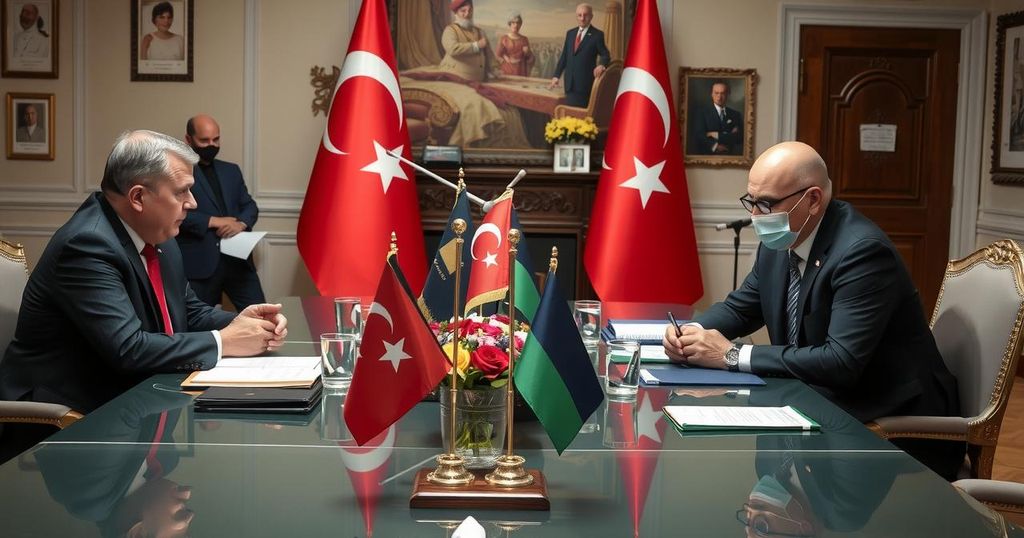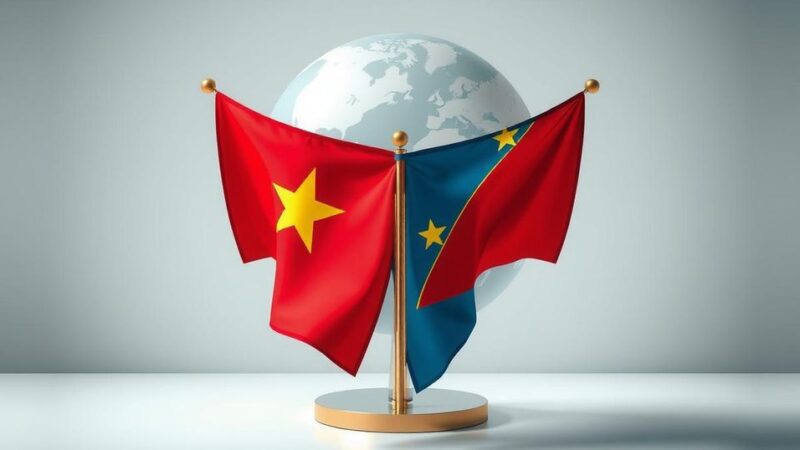Turkey’s Foreign Minister Hakan Fidan held discussions with Syrian leader Ahmed al-Sharaa in Damascus focused on supporting Syria’s new administration following Bashar al-Assad’s fall. The talks align with Turkey’s longstanding goal of impacting Syrian governance while addressing the challenges posed by Kurdish militias in the northeast. This meeting reflects Turkey’s strategic interests in the region amidst ongoing conflict.
On Sunday, Turkey’s Foreign Minister Hakan Fidan met with Ahmed al-Sharaa, also known as Abu Mohammed al-Golani, in Damascus to discuss support for Syria’s newly established administration following the recent fall of President Bashar al-Assad. The meeting, which was confirmed by Turkey’s foreign ministry, was marked by friendly gestures, including handshakes and hugs, as the two leaders were joined by a large delegation.
President Tayyip Erdogan had previously announced Turkey’s intention to aid the formation of a state structure in Syria, alongside drafting a new constitution, with Fidan’s visit serving this purpose. Ibrahim Kalin, head of Turkey’s MIT intelligence agency, had also visited Damascus shortly after Assad’s ousting, highlighting Turkey’s proactive stance in the region.
Over the years, Turkey has supported opposition groups seeking to dethrone Assad, and his fall is seen as an opportunity to expedite the return of millions of Syrian refugees housed in Turkey. The meeting also coincides with ongoing tensions in northeast Syria, where Turkish-backed forces are engaged in conflict against the Kurdish YPG militia, a group perceived as a terrorist organization by Ankara, which poses a significant challenge to the Kurdish-led Syrian Democratic Forces (SDF).
Ankara’s ambition includes fostering a stable administration in Syria that is receptive to Turkey’s objectives in the region, which may lead to further military actions against Kurdish positions. The SDF, already on the defensive since Assad’s removal, faces an uncertain future as Turkish influence in Syria increases under the new leadership supported by Ankara.
This article highlights the recent diplomatic initiative by Turkey in response to the changing power dynamics in Syria following the ousting of President Bashar al-Assad. Turkey’s Foreign Minister Hakan Fidan’s meeting with Ahmed al-Sharaa underscores Turkey’s commitment to shaping Syria’s political landscape post-Assad. Turkey has a vested interest in establishing a new governance framework in Syria, alongside facilitating the return of Syrian refugees and curtailing the influence of Kurdish forces it deems terrorist. The meeting is set against a backdrop of continuing military developments in northern Syria, as Turkey seeks to expand its influence while facing challenges from Syrian Kurdish groups supported by the U.S. The meeting reflects broader regional dynamics, where ongoing conflict, power vacuums, and foreign interests converge, resulting in shifting alliances and military confrontations that will shape Syria’s future.
In summary, Turkey’s engagement in Syria’s political reformation following Assad’s departure indicates its desire to consolidate influence in the region. The meeting between Foreign Minister Hakan Fidan and Ahmed al-Sharaa illustrates Turkey’s proactive approach to establishing a new governance system in Syria while contending with Kurdish forces that challenge its territorial ambitions. As the situation unfolds, Turkey’s actions will be critical in determining the future political and military landscape of Syria, impacting regional stability.
Original Source: www.hindustantimes.com







